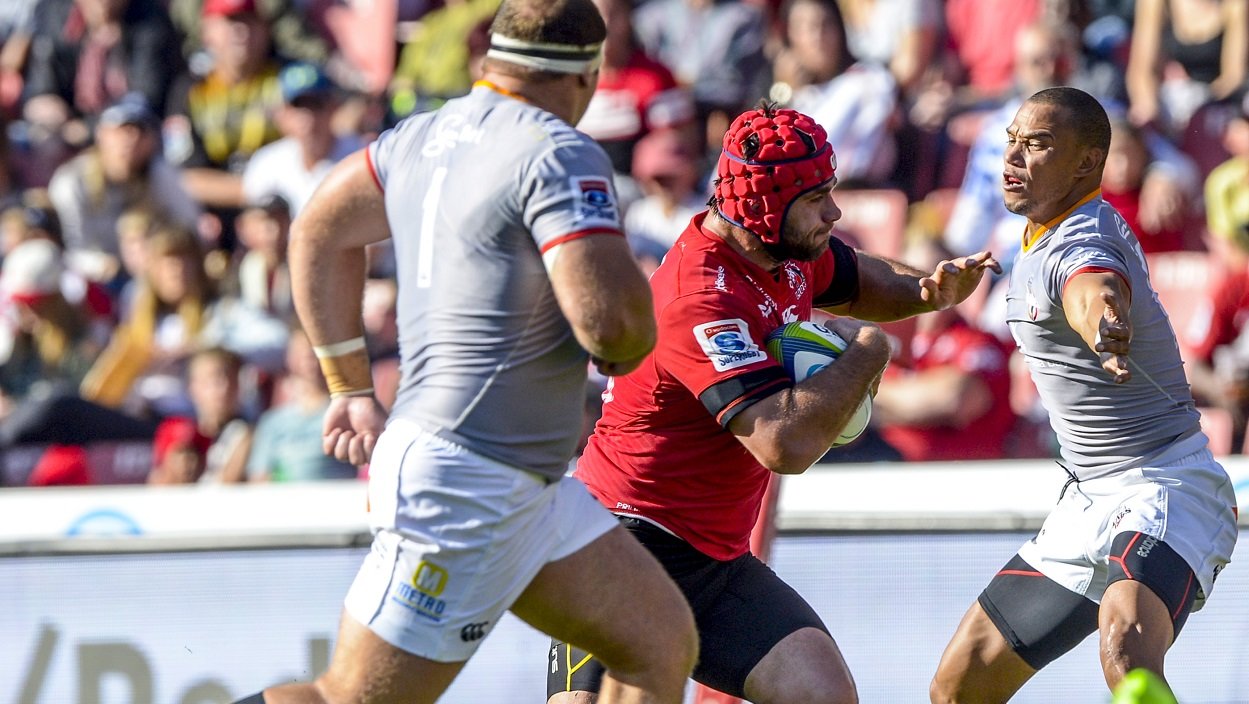Taking red card sanction out of the game would turn rugby into a lawless free-for-all, writes James Harrington.
It’s fair to say Lions’ coach Johan Ackermann is no fan of red cards – particularly when they’re handed out to one of his players. Even if the Lions win.
You may have seen last weekend’s incident, in which hooker Robbie Coetzee was sent off following the gentle application of his knee to the facial area of Kings’ flanker Chris Cloete in the 31st minute of the game after the latter blundered dangerously into a ruck.
Coetzee subsequently received a five-week ban after a SANZAAR Foul Play Review Committee ruled his intervention, relatively soft though it looked, was intentional.
Coetzee’s guilty plea, apology and remorse earned him a three-week reduction on an initial eight-week ban. That means he will only miss the Lions’ next Super Rugby match against the Sunwolves on July 1.
But Ackermann believes red cards ‘take the contest’ out of a game, which he clearly believes should feature two sides of 15 players battering the bejaysus out of each other for 80 minutes, plus stoppage time for injuries. Forget the referee, he’s intimating, picking the bones out of the resulting bloody mess should be a job for the disciplinary body.
Ackermann said after the citing commission’s decision: “I believe there is enough time after a match to do the whole process of issuing red cards. Giving a player a yellow card during the game is a solution, but a red card takes the contest away, especially at Test match level.”
Never mind that his side walked the match 54-10 despite playing with 14 men for 50 minutes. Which really has Ackermann’s contest argument bang to rights, from the outset.
But, in case he needs further evidence. On the same weekend, Clermont scored twice after Flip van der Merwe was sent off for doing his best to decapitate Teddy Thomas early in the second half of their semi-final victory over Racing 92. Tom Wood’s red did not stop Northampton coming from behind to beat Stade Francais in a Champions Cup qualifying play-off. La Rochelle were minutes away from beating Toulon in their Top 14 semifinal, despite losing Pierre Aguillon after he tried to use James O’Connor’s bleached head as a pneumatic drill in the middle of the pitch.
As for Test matches, England beat Argentina at Twickenham in November 2016 even after Elliot Daly got his marching orders early on.
So, no, red cards don’t always decide games. And they definitely do not ‘take away the contest’.
Ackermann argued these incidents should merit a yellow card only, with any additional sanctions decided after the game. But why should players who do something dangerous or illegal not face immediate sanction? And why should teams whose players do something dangerous or illegal not face the consequences of those sanctions where and when it matters – that is to say, during the game?
Next season’s head coach at Gloucester said: “I know Robbie didn’t mean to hurt the Kings player, he was merely reacting to what was happening in front of him. Robbie is not a dirty player and he’s not that sort of person.”
When World Rugby tightened the tackle laws came in at the turn of the year, there was concern that their outcome-led application robbed referees of discretion to employ common sense.
With some justification. A deterrent only works if it stops intentional actions. Similarly, numerous dangerous-tackle red cards so far in 2017 came after the ball-carrier slipped, or dipped into a tackle.
But referees are beginning to make the distinction between a genuine high tackle – an Aguillon-level clothesline, for example, as opposed to a player’s arm slipping up in a tackle, or the ball-carrier stumbling at an unfortunate moment. Accidentally high tackles are increasingly being taken into consideration.
Sometimes referees get it wrong. Quade Cooper was perhaps unfortunate to see red for a swinging arm in March when his Reds lost, ironically, to the Lions. And that’s unfortunate.
But errors of interpretation, or the polar opposite opinions of protective head coaches to the decisions of referees, is no reason to take away the strongest sanction in a referee’s armoury.
World Rugby made players’ heads no-go areas for a reason – to cut down on the unsustainable rate of concussions in the game. And Coetzee committed an illegal act: he kneed an opposition player in the head. Deliberately. Right in front of the referee. Who was Jaco Peyper. That he isn’t a dirty player and was ‘merely reacting’ to what was happening in front of him is irrelevant – except in mitigation at a later hearing. Besides, it was neither accidental nor unintentional.

































































